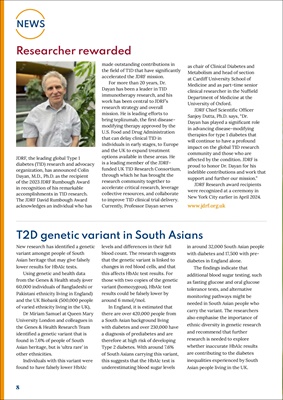
8
NEWS
Researcher rewarded
JDRF, the leading global Type 1
diabetes (T1D) research and advocacy
organization, has announced Colin
Dayan, M.D., Ph.D. as the recipient
of the 2023 JDRF Rumbough Award
in recognition of his remarkable
accomplishments in T1D research.
The JDRF David Rumbough Award
acknowledges an individual who has
made outstanding contributions in
the field of T1D that have significantly
accelerated the JDRF mission.
For more than 20 years, Dr.
Dayan has been a leader in T1D
immunotherapy research, and his
work has been central to JDRF's
research strategy and overall
mission. He is leading efforts to
bring teplizumab, the first diseasemodifying
therapy approved by the
U.S. Food and Drug Administration
that can delay clinical T1D in
individuals in early stages, to Europe
and the UK to expand treatment
options available in these areas. He
is a leading member of the JDRFfunded
UK T1D Research Consortium,
through which he has brought the
research community together to
accelerate critical research, leverage
collective resources, and collaborate
to improve T1D clinical trial delivery.
Currently, Professor Dayan serves
as chair of Clinical Diabetes and
Metabolism and head of section
at Cardiff University School of
Medicine and as part-time senior
clinical researcher in the Nuffield
Department of Medicine at the
University of Oxford.
JDRF Chief Scientific Officer
Sanjoy Dutta, Ph.D. says, "Dr.
Dayan has played a significant role
in advancing disease-modifying
therapies for type 1 diabetes that
will continue to have a profound
impact on the global T1D research
community and those who are
affected by the condition. JDRF is
proud to honor Dr. Dayan for his
indelible contributions and work that
support and further our mission."
JDRF Research award recipients
were recognized at a ceremony in
New York City earlier in April 2024.
www.jdrf.org.uk
T2d test & South Asians
New research has identified a genetic
variant amongst people of South
Asian heritage that may give falsely
lower results for HbA1c tests.
Using genetic and health data
from the Genes & Health study (over
60,000 individuals of Bangladeshi or
Pakistani ethnicity living in England)
and the UK Biobank (500,000 people
of varied ethnicity living in the UK),
Dr Miriam Samuel at Queen Mary
University London and colleagues in
the Genes & Health Research Team
identified a genetic variant that is
found in 7.6% of people of South
Asian heritage, but is 'ultra rare' in
other ethnicities.
Individuals with this variant were
found to have falsely lower HbA1c
levels and differences in their full
blood count. The research suggests
that the genetic variant is linked to
changes in red blood cells, and that
this affects HbA1c test results. For
those with two copies of the genetic
variant (homozygous), HbA1c test
results could be falsely lower by
around 6 mmol/mol.
In England, it is estimated that
there are over 420,000 people from
a South Asian background living
with diabetes and over 230,000 have
a diagnosis of prediabetes and are
therefore at high risk of developing
Type 2 diabetes. With around 7.6%
of South Asians carrying this variant,
this suggests that the HbA1c test is
underestimating blood sugar levels
in around 32,000 South Asian people
with diabetes and 17,500 with prediabetes
in England alone.
The findings indicate that
additional blood sugar testing, such
as fasting glucose and oral glucose
tolerance tests, and alternative
monitoring pathways might be
needed in South Asian people who
carry the variant. The researchers
also emphasise the importance of
ethnic diversity in genetic research
and recommend that further
research is needed to explore
whether inaccurate HbA1c results
are contributing to the diabetes
inequalities experienced by South
Asian people living in the UK.